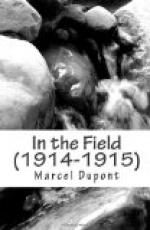Whilst we were talking, my troop, led by its non-commissioned officer, came to the place where we were, edging along by the walls. The men, calm and smiling, with their carbines ready, waited in silence for the signal to advance. I signed to them to wait a little longer, and then going round the wall I found myself suddenly in the thick of the fray. I must say the reception I got startled me. The bullets came rattling in hundreds, chipping the walls and cutting branches from the trees. On our side there was absolute silence. Our men, on their knees or lying flat behind any cover they could find, did not reply, as they could see nothing, and waited stoically under the shower of bullets until their adversaries chose to advance.
I looked for Captain de L., who commanded the first squadron. There he was, standing with his face to the enemy, and his hands in his pockets, quietly giving his orders to a non-commissioned officer. On my asking him if he wanted me, he explained the situation: the enemy, numbers unknown, was occupying the woods overlooking Jaulgonne to the east. It was impossible for us to debouch just yet. The essential thing was to hold the village, and consequently the bridge, until our infantry could come up. He told me that the first troop of my squadron, led by Lieutenant d’A., had just advanced, in extended order, into the vineyards, orchards, and fields stretching between the road and the river. He was going to reconnoitre the woods and see what kind of force was holding it.
“You see, dear fellow, for the present I don’t want the help of your carbines; I have my whole squadron here, and they can’t get a shot. So long as the enemy sticks to the wood all we can do is to wait and keep our powder dry.”
I put my troop under shelter in a small yard, and directed my non-commissioned officer to keep in touch with me, in case I might want him. Then I went back to the outskirts of the village to examine the ground. I then joined my friend S. behind a large heap of faggots: he commanded the nearest troop of the first squadron, and we could not help laughing at the curious situation—being formed up for battle, fronting the enemy, under a hail of bullets, and not able to see anything.
During the campaign S. had become a philosopher, and he deserved some credit for it; for the great moral and physical sufferings we had endured must have been even still more insupportable to him than to any of us. In the regiment, S. was considered preeminently the Society officer. He went to all the receptions, all the afternoon teas, all the bridge parties, all the dinners. He was an adept at tennis and golf and a first-rate shot. His elegance was proverbial, and the beautiful cut of his tunics, breeches, jackets, and coats was universally admired. The way his harness was kept and the shape of his high boots were a marvel. To say all this is to give some idea of the change he suddenly experienced in his habits




